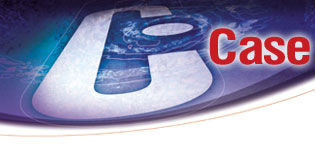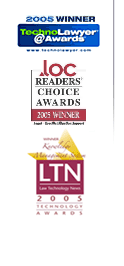


 |
 |
 |
 |
 |
 |
 |
What’s New in LexisNexis® CaseMap® 9?
CaseMap 9 provides secure remote access to case files using a
Microsoft® SQL Server®. Use of CaseMap 9 SQL gives users the ability to
share cases across offices, making for easier collaboration. SQL cases provide additional
security and flexibility so that different users can use different sets
of features they need to work on the cases.
CaseMap 9 also works just like earlier versions of CaseMap with cases
saved on a familiar office network. And CaseMap 9 has been tuned to work
better in the Windows 7 environment and runs on 64 bit Windows® Vista
and Windows® 7.
CaseMap users who are familiar with using CaseMap's earlier versions
will not have to learn any new features--the only thing that has changed
is the flexibility of creating some cases that may be unusually large or
long-lived for the CaseMap SQL server environment.
Feature set identical to CaseMap 8
Existing CaseMap users will recognize a set of familiar features identical to those in CaseMap 8 and 8.5. The appearance of CaseMap 9 is the same as CaseMap 8.
Same Price
At present, there is no additional cost for CaseMap 9 SQL components required to enable a SQL server to host CaseMap cases. If your organization has CaseMap subscriptions that are current then you'll have the option to use CaseMap 9 SQL if you wish.
Hosting case files on an SQL server
The
CaseMap case files pre-CaseMap 9 store case information in a database
built on the same "chassis" as Microsoft® Access.
CaseMap 9 introduces case files that can be created and stored on SQL
server, making it easier, more robust and scalable to sort out case data
and relationships. Don't worry if your organization does not have a SQL
server. There's no need to buy one and set it up because CaseMap v9.0
still creates case files that can be stored locally on a regular network
server.
Click here to view a diagram of CaseMap 9 SQL architecture over a wide area network.
Two types of case files
SQL Cases: created by an administrator using a special CaseMap Admin Console. Designated case staff are assigned to cases by the administrator.
Local Cases: can be created by anyone running CaseMap 9 and saved
to a designated network folder. Case staff can be edited by anyone who's
authorized to do so. The local cases are exactly the same as the
pre-CaseMap 9 cases have been.
Centralized Case and User Administration
The organizations that use CaseMap 9 SQL will be able to centrally control the creation of new SQL cases and assign users to the cases. IT and Litigation Support professionals have asked us for greater security for CaseMap case files and CaseMap 9 delivers. The administrator will be able to assign specific permissions for case staff. For example, some users may be able to enter data but not able to create or delete custom fields.
Better Performance
It's common in larger firms for case files to be shared over a wide area network (WAN). Complex cases may grow over time to be large files. CaseMap 9 SQL cases will provide faster performance over a WAN and easily handle large amounts of case data, even if members of the team are working on the same case file from New York and Los Angeles at the same time.
Questions, Support & Sales
For sales questions please contact your LexisNexis CaseMap Account Representative or email casemap.sales@lexisnexis.com.
For technical support please call 877-301-0344. International users
please call 904-373-2160. Hours for live support are 9:00 AM to 9:00 PM,
Eastern U.S. time. Email us at
casemap.support@lexisnexis.com.
CaseMap 9 SQL Technical Specifications
Click here to learn more about the technical specifications for CaseMap
9 SQL.
We hope you enjoy using CaseMap 9!
CaseSoft | 904.273.5000
CaseMap | TimeMap | TextMap | NoteMap | DepPrep